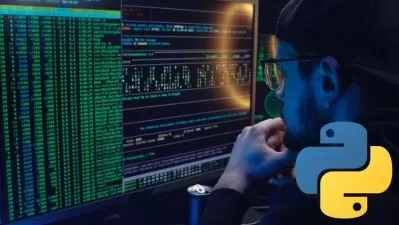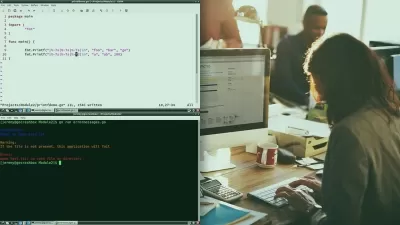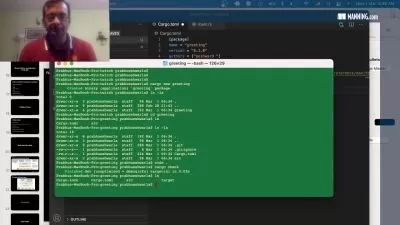Mulesoft Mule ESB 4.7 Beginner to Paid Professional (2024)
Jagadeesh Venkata Madduri
17:11:47
Description
Mule Certified Developer MCD Level 1 Level 2 | 50+ Hands-on exercises | Dataweave | API Proxies | OAuth | RAML, Cloudhub
What You'll Learn?
- API-Led connectivity, Microservices Architecture and Application Networks
- Design REST APIs with RAML Specification
- Build REST APIs using Mule using RAML Specification
- Dataweave 2.7 from scratch to advanced level
- Using various connectors i.e. Http, File, Database, FTP and many more
- Build SOAP APIs using Mule using WSDL files
- Complete details about Mule Event data model
- Validations and Routing
- Various Deployment Topologies And Deploy Mule Apps to Cloudhub, On-prem and Hybrid models
- Create API Proxy and apply policies
- Error Handling in depth
- Consume Web Services (SOAP And REST)
- Configure Caching, HTTPS, Transactions
- Use CICD (Jenkins) to automate deployment process
- Testing Mule Apps with MUnit 3
- Mule Batch processing in depth
- Execute Custom Java code in Mule App
- Create and Use Object Stores
- Schedule data sync between data systems
- For each and Aggregators
Who is this for?
What You Need to Know?
More details
DescriptionThis is a complete course on Mule 4.7 (latest version) for developers and testers. Around 5000 companies are using Mulesoft across the world currently. It is most demanded course in the market. Who else is better to teach you Mule 4.x than a former Mule certified trainer like me.
If you want to prepare for MuleSoft Certified Developer (Level 1 and Level 2), this is the course for You. You will also get a complementary PDF on complete RAML 1.0.
In this course you will learn Mule ESB 4 and Anypoint Platform with more than 20 practical exercises. Less theory and more practical oriented.
You will get your hands dirty all the times by practicing the below topics:
Microservices architecture, API-Led connectivity
Various tools of Anypoint Platform
Design RAML Specification
Using Anypoint Studio in depth
Implement REST APIs using Mule based on RAML Specification
Create highly reliable and highly available mule applications
Object Store v2, Caching, Https (SSL and TLS)
Cloudhub 1.0 and Cloudhub 2.0
Error Handling in depth
System APIs, Process APIs and Experience APIs
Zero downtime deployments
Integration with Database, FTP, File system, SaaS apps, JMS, SOAP, REST and many more
MUnit 3.0 in depth
API Management using Anypoint Platform
Understand Mule Event data model
Various best practices while creating Mule apps
Use Anypoint Studio to build, test, and debug basic integration mule applications
Perform basic and advanced data transformations using DataWeave 2.0
Various routers and validations
Mule batch jobs
Execute Custom Java code in Mule Apps
And more!
After Each module you will practice questions and answer to help understand your understanding level.
Why This Course Is Different:
Most of the courses explain in theoretical perspective, but this course is more than 50% hands-on. What ever the theory I explain, would be explained with a practical example. For each topic I explain what happens under the hood which will be done by only very few trainers. So if you want learn mule in depth from a former Mule certified instructor, then this is the course for you.
Who this course is for:
Anyone interested in learning Mule Soft to help with their current job or to find a new role.
Anyone looking to clear Mule Soft Developer Certification
Mule 3 Developers who are looking to know and understand mule 4
Who this course is for:
- Developers who wants to be productive on their Mule Projects
- Developer who are looking for Better salary hikes
- Developer who are looking for Better role in the company
- Developers who are interested in learning the best ESB in the market
- Developers who are trying to enhance their skill set with top technologies
- Developers with at least 6 moths to 1 years experience in IT industry
- Freshers who are looking for jobs
This is a complete course on Mule 4.7 (latest version) for developers and testers. Around 5000 companies are using Mulesoft across the world currently. It is most demanded course in the market. Who else is better to teach you Mule 4.x than a former Mule certified trainer like me.
If you want to prepare for MuleSoft Certified Developer (Level 1 and Level 2), this is the course for You. You will also get a complementary PDF on complete RAML 1.0.
In this course you will learn Mule ESB 4 and Anypoint Platform with more than 20 practical exercises. Less theory and more practical oriented.
You will get your hands dirty all the times by practicing the below topics:
Microservices architecture, API-Led connectivity
Various tools of Anypoint Platform
Design RAML Specification
Using Anypoint Studio in depth
Implement REST APIs using Mule based on RAML Specification
Create highly reliable and highly available mule applications
Object Store v2, Caching, Https (SSL and TLS)
Cloudhub 1.0 and Cloudhub 2.0
Error Handling in depth
System APIs, Process APIs and Experience APIs
Zero downtime deployments
Integration with Database, FTP, File system, SaaS apps, JMS, SOAP, REST and many more
MUnit 3.0 in depth
API Management using Anypoint Platform
Understand Mule Event data model
Various best practices while creating Mule apps
Use Anypoint Studio to build, test, and debug basic integration mule applications
Perform basic and advanced data transformations using DataWeave 2.0
Various routers and validations
Mule batch jobs
Execute Custom Java code in Mule Apps
And more!
After Each module you will practice questions and answer to help understand your understanding level.
Why This Course Is Different:
Most of the courses explain in theoretical perspective, but this course is more than 50% hands-on. What ever the theory I explain, would be explained with a practical example. For each topic I explain what happens under the hood which will be done by only very few trainers. So if you want learn mule in depth from a former Mule certified instructor, then this is the course for you.
Who this course is for:
Anyone interested in learning Mule Soft to help with their current job or to find a new role.
Anyone looking to clear Mule Soft Developer Certification
Mule 3 Developers who are looking to know and understand mule 4
Who this course is for:
- Developers who wants to be productive on their Mule Projects
- Developer who are looking for Better salary hikes
- Developer who are looking for Better role in the company
- Developers who are interested in learning the best ESB in the market
- Developers who are trying to enhance their skill set with top technologies
- Developers with at least 6 moths to 1 years experience in IT industry
- Freshers who are looking for jobs
User Reviews
Rating
Jagadeesh Venkata Madduri
Instructor's Courses
Udemy
View courses Udemy- language english
- Training sessions 61
- duration 17:11:47
- Release Date 2024/10/03










